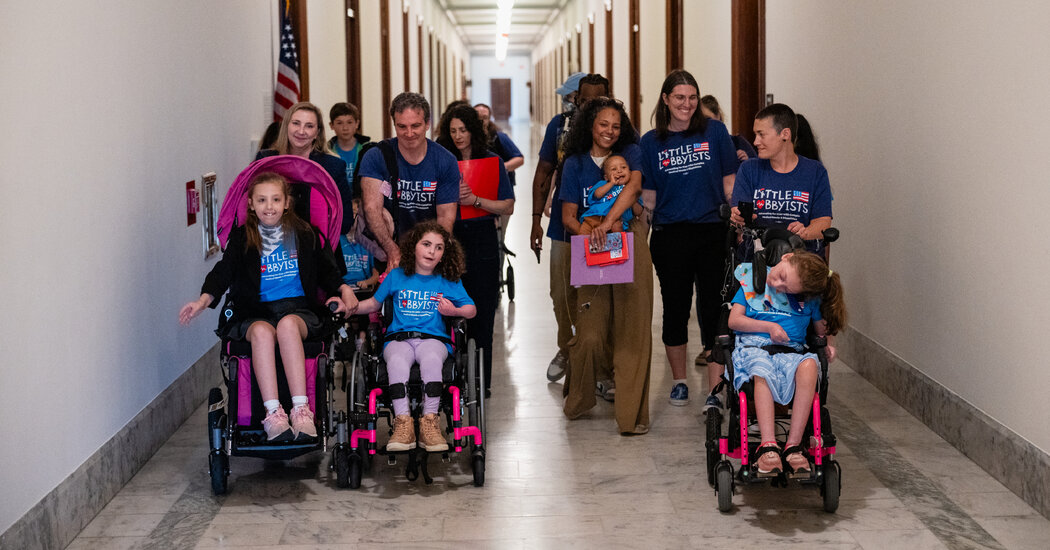Landry Bell, a 1-year-old boy who was born with Down syndrome, wriggled and smiled in his big sister’s lap on the floor outside Republican Senator Mike Lee’s office this week as he took a break from going office to office with his mother while she explained how cuts to Medicaid would devastate their family.
Wearing a bright blue T-shirt emblazoned with the words “Little Lobbyists,” Landry was among a group of children with serious medical needs who crisscrossed the Capitol with their parents urging senators to vote “no” on the sprawling Republican bill carrying President Trump’s agenda. The legislation would cut deeply into Medicaid to help pay for large tax cuts that would benefit businesses and the richest Americans.
The Senate version of the legislation would make even more aggressive cuts to Medicaid than the version of the legislation that passed the House last month. Those proposed reductions, and the elimination of some clean-energy tax credits, are among the most contentious provisions driving debate on the bill among Republicans, as party leaders push to complete it and send it to Mr. Trump’s desk within weeks.
The Little Lobbyists formed in 2017 during Mr. Trump’s first term to push back against Republican efforts to repeal the Affordable Care Act, taking to Capitol Hill to demand that lawmakers oppose the move. Their successful campaign to save the law was part of a broader backlash against the proposal, which was driven in large part by major health care lobbies, like hospitals and insurance companies, as well as patient groups worried about losing insurance coverage.
This year, the bigger lobbying players have been more muted about the sprawling Republican policy measure that Mr. Trump and his party are calling their “big, beautiful bill,” which Democrats decry as an abomination. There are fewer television ads and demonstrations, and fewer furious public statements from health provider groups warning about the potential effects of the cuts.
But the little ones are out in force. About two dozen children and their family members made their way through the halls of Congress this week to make their case against the bill. They scored meetings with Senator Susan Collins, Republican of Maine and the chairwoman of the Appropriations Committee; Senator John Fetterman, Democrat of Pennsylvania; Senator Jon Husted, Republican of Ohio; and aides for eight other G.O.P. senators, including Mr. Lee of Utah.
Joining Landry were several other children who navigated the marble hallways in wheelchairs or medical strollers. Some relied on feedings through a tube during the long day of meetings. The children, many of them nonverbal, crowded into senators’ offices. At one stop they snapped photos with Mr. Husted and his wife, Tina. At another, they sat on a couch alongside Ms. Collins as their parents made their case against slashing Medicaid.
“To take it away completely would just be devastating,” said Charlotte Cravins, Landry’s mother, who said that even with private health insurance, her family had been on the verge of bankruptcy from her son’s hospital bills until they were approved for Medicaid coverage.
Though the measure would not directly impact services that medically complex children receive, their families have mobilized against it, fearing that some of the Medicaid cuts could reverberate through the program, ultimately making it more difficult and costly for them to get the care they need.
The message dovetails with the one that Democrats have been making as they condemn the bill, arguing that it will harm the poorest and most vulnerable people.
“If you were to cut Medicaid, things aren’t going to get better, they’re going to get worse,” Representative Hakeem Jeffries, Democrat of New York and the minority leader, said on Wednesday during a visit to a hospital in Brooklyn. “Children will be hurt, everyday Americans will be hurt, people who rely on Medicaid with disabilities will be hurt. Many older Americans will be hurt.”
Republicans argue the changes they are proposing to Medicaid are designed to refocus resources on its most vulnerable beneficiaries. But the cuts could leave big holes in some states’ budgets, including in Louisiana, where Landry and his family live.
The Senate proposal would slash a widely used — if convoluted — strategy that many states employ to finance their Medicaid programs. How states will adjust is unclear. Some might cut back on payments to medical providers, which could reduce the number of physicians willing to treat children in Medicaid. Others might choose to eliminate a few optional benefits in the program.
“It’s a fallacy to think that the federal government can do this level of substantial cuts to Medicaid and that states won’t have to make hard decisions that impact the most vulnerable people on Medicaid,” said Gwen Orlowski, executive director of Disability Rights New Jersey.
One key benefit available through state Medicaid programs is home-based care for people with long-term care needs. Medicaid would continue to cover care in a nursing home, but Ms. Cravins wants to keep her son at home with her. Lawmakers might also find the money some other way — like cutting education funding or raising taxes — but the families that met with senators this week were not willing to wait and take that chance.
Ms. Orlowski said some parents of children with disabilities, including those who need to be monitored around the clock, worry their loved ones won’t receive the intensive care they need in a nursing home. “We have heard this from parents: ‘And they’ll die there,’” she said.
Democrats have hammered the message as they rail against the package, which Republicans are moving through Congress using special rules that shield it from a filibuster, leaving Democrats powerless to defeat it if the G.O.P. stays unified.
At a House hearing in May, Democrats held up photos of disabled, young, or senior constituents, as they talked about Medicaid’s essential role in protecting the vulnerable. Patients in wheelchairs were seated prominently in the hearing room, and some were escorted out after disrupting the proceedings to protest the bill.
Senator Ron Wyden of Oregon said he has been talking with Republicans about the impact the Medicaid cuts would have on Americans with disabilities and on seniors.
“These are folks walking an economic tightrope, every day balancing this cost against the other cost,” said Mr. Wyden, the top Democrat on the Senate Finance Committee.
Many of the bill’s cuts are reserved for adults without disabilities. A large chunk of its savings comes from a strict work requirement for Americans who gained Medicaid coverage through an expansion of the program created by the Affordable Care Act and through other increases in paperwork requirements that would require beneficiaries to prove their eligibility more often.
But the cuts to state Medicaid financing in the Senate bill could have broader implications, including shuttering some rural hospitals, an issue that has drawn the attention of Senator Josh Hawley, Republican of Missouri.
“It’s just not the right thing to do to shut down a bunch of rural hospitals to pay for tax cuts,” Mr. Hawley said this week, as he remarked that his party’s bill “needs a lot of work.”
When a child with disabilities needs medical care, a rural hospital may be their first stop, before transferring to a larger hospital that can provide advanced care.
“If those rural hospitals stop existing, either those children die or their families are forced to move, assuming they have enough money to be able to move,” said Matthew Cortland, a senior adviser with Little Lobbyists. “So we are deeply concerned.”
Megan Mineiro is a Times congressional reporter and a member of the 2025-26 Times Fellowship class, a program for early-career journalists.
Margot Sanger-Katz is a reporter covering health care policy and public health for the Upshot section of The Times.
The post ‘Little Lobbyists’ Urge Senators to Oppose Trump’s Bill Cutting Medicaid appeared first on New York Times.




